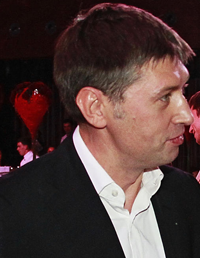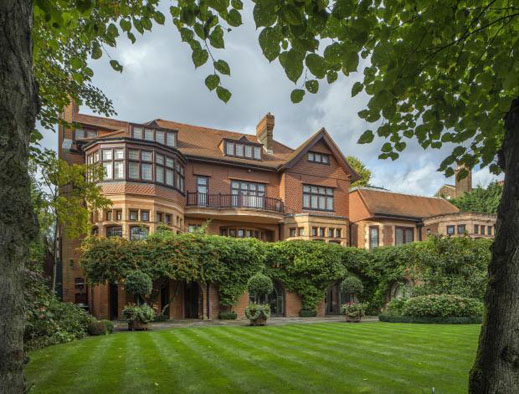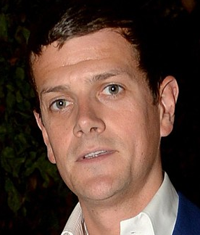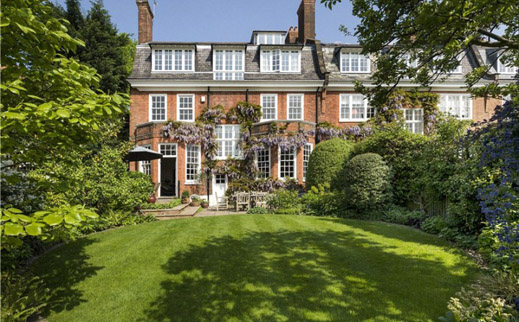
By John Helmer, Moscow
If Andrei Goncharenko paid £43 million for an asset worth no more than half as much, he has set something of a Russian record for business acumen. And he might well have kept that acumen secret, if not for a group of squabbling Englishmen wanting commissions for arranging the deal, and one in particular, who wanted to keep about £20,000 in value-added tax on his commission, to which the Commissioners for Her Majesty’s Revenue and Customs thought they were entitled instead.
Goncharenko is the deputy chief executive of a Gazprom subsidiary called GazpromInvest Yug (South). The company was created in 2002 as a contractor for construction projects decided on by its parent. The company website claims it does things like the “organization of construction and reconstruction of gas processing plants, the main gas pipelines, compressor stations, underground gas storage, gas distribution stations. In addition, the company is organizing the construction of energy, communications, infrastructure (boilers, wastewater treatment plants)…reconstruction of complex engineering and technical security systems, and anti-terrorist protection of objects.”
 Goncharenko’s (right) name can’t be found on the company website. The company spokesman refuses to say what his title is, and whether he is senior enough in the management to be required under current Russian law to disclose his assets and income outside Russia. Goncharenko’s name, title, and business wouldn’t be known publicly at all if not for allegations of asset raiding, extortion, fraud, and corruption between Goncharenko, his company, and sub-contractors. Among the charges Goncharenko has been accused of taking kickbacks of Rb3 billion (about $100 million).
Goncharenko’s (right) name can’t be found on the company website. The company spokesman refuses to say what his title is, and whether he is senior enough in the management to be required under current Russian law to disclose his assets and income outside Russia. Goncharenko’s name, title, and business wouldn’t be known publicly at all if not for allegations of asset raiding, extortion, fraud, and corruption between Goncharenko, his company, and sub-contractors. Among the charges Goncharenko has been accused of taking kickbacks of Rb3 billion (about $100 million).
The allegations cover the period from 2010 through 2012. The media publishing the allegations include Izvestia, Sobesednik, and Russia Today. Gazprominvest Yug is quoted as denying the accusations, and counter-claiming that they were motivated by business rivalry. Investigations reported as taking place in 2013 by Moscow prosecutors and by the Ministry of Interior have not substantiated the publications, and resulted in no indictments.
The fact that Goncharenko paid £43 million in December 2010 for a residence at 22 Lyndhurst Road, Hampstead, in northern London (below), has been confirmed in the dossier of the United Kingdom’s Tax Chamber of the First-Tier Tribunal. The public record was issued on June 26. The additional facts that Goncharenko has been occupying the house, and put it up for sale for several months of last year, have been confirmed by real estate agency sources, and by website postings by the Savills agency in Hampstead. Goncharenko’s asking price was £46.5 million – until the For Sale sign came down in January of this year.

UK property records also confirm that the name of the purchaser of the property was a Gibraltar-registered company called Starcluster Ltd.
The seller of 22 Lyndhurst Road was a property developer called Anthony Lyons. He had bought the house for £12.5 million in 2005. Reportedly, he then spent another £10 million fixing it up. His return on reselling to Goncharenko and Starcluster was 51% per annum, or 254% over the five years. If you (and Goncharenko) count the extra investment as worth paying for, Lyons got just under double what he had spent, or about 18% per annum.
 The London press have been drawn to 22 Lyndhurst Road, not because of Lyons’s name; nor because the £43 million was “the most expensive price paid for a Hampstead residential property ever”; nor even because Goncharenko tried keeping his name out of the business. The press were attracted because one of the commission agents claiming 2% of the deal was named Anthony Spencer-Churchill (right); because the name signifies a Winston descendant; and because, as a serious newspaper put it, he “has been romantically linked with a series of society ladies including Pippa Middleton, the Duchess of Cambridge’s sister.”
The London press have been drawn to 22 Lyndhurst Road, not because of Lyons’s name; nor because the £43 million was “the most expensive price paid for a Hampstead residential property ever”; nor even because Goncharenko tried keeping his name out of the business. The press were attracted because one of the commission agents claiming 2% of the deal was named Anthony Spencer-Churchill (right); because the name signifies a Winston descendant; and because, as a serious newspaper put it, he “has been romantically linked with a series of society ladies including Pippa Middleton, the Duchess of Cambridge’s sister.”
Arguing on his own behalf before the tax tribunal last month, Spencer-Churchill claimed he was entitled to his commission of £125,000 without having to pay value-added tax (VAT). The tribunal record shows “there was then a considerable haggle as to who would receive fees from Mr. Lyons in connection with the sale”. In addition to Spencer-Churchill, the others claiming their piece of the action were the law firm Mishcon de Reya; two real estate agencies, Aylesfords and Knight Frank; and another individual identified in the proceedings only by his first name.
Knight Frank is reported to have shown Goncharenko the property several months earlier, and then gazumped him; that’s when the seller or his agent accepts an oral price offer from one buyer and goes to another for a higher price. It’s generally illegal. So when Goncharenko thought he had a deal with Spencer-Churchill acting for Lyons, he acted swiftly.
Spencer-Churchill told the tax tribunal he should not have to pay the 17.5% VAT on his commission (£21,875) because he thought he was acting as a gentleman, not as a tradesman. “I was helping a friend out. There was no agreement between Mr. Lyons and me for any payment to be made for this. I would have introduced Mr. Lyons to Mr. Goncharenko whether or not he was going to pay me. I thought as a gentleman he might give me something as a token of thanks. I would refer to what I expected as ‘a drink’- not because I expected it to be of very low value but because there was no agreement for payment.”
The tribunal decided there was evidence that Spencer-Churchill had been in the business of mediating asset purchases by high net-worth individuals, and that his claim for an exemption from VAT on the ground of an illness should be disallowed. The ruling was that Spencer-Churchill was engaged in a taxable business when he helped Goncharenko buy from Lyons, and is liable to pay the tax.
Among the documents in evidence, the dossier indicates that four months before Goncharenko offered Lyons £43 million, Lyons told Spencer-Churchill his sale price was £39 million. The tribunal recorded that £43 million, “according to the Appellant…was an astonishing offer, considerably in excess of the value of the property.”
These numbers, and that opinion, have attracted the attention of Private Eye, a fortnightly publication in London of investigative journalism and comedy. On Russian topics the paper has a particularly imprecise record. On July 11 it reported that “other deals suggest he [Spencer-Churchill] was right; just a few months later a not-much-smaller seven-bedroomed house on the same road went for a quarter of the price, a mere £10.9m”.
Private Eye’s calculation that a secretive Russian’s purchase for an “inflated price”, with money borrowed from Geneva and run through Gibraltar, depended on the comparison pricing. The newspaper concluded the bank lender was “presumably satisfied that the money backing the purchase was all above board”. The suspicion that it might not be so remained in print, however, because of Goncharenko’s nationality, the Gazprom connexion, and concealment.
London property sources have compared the transaction values on Lyndhurst Road, and divided sale prices by residential area in square feet. The sources claim the currently posted sale price of £7.95 million for the house next door to Goncharenko, 21 Lyndhurst Road (below), is not comparable because Goncharenko’s property is three times the size inside the house, and has a much larger garden as well. Applying the square-footed valuation should produce a price of at least £22 million, the sources say. That’s 44% less than Lyons’s asking price; 49% less than Goncharenko’s purchase price.

Source: http://search.savills.com/
The cheaper asset is also an attached terrace house. Goncharenko’s house is unattached and free-standing. In agent lingo, “it is a truly exceptional property; it has very few peers [in Hampstead]; and these are quite unusual trades.” So, from a market assessment Number 22 appears to have been worth the premium Goncharenko offered, then paid for it.
So, did it happen that Goncharenko paid far more than market value, and if so, why?
An international banker says such deals don’t occur in the real world. If they did, his suspicion is that the seller and the buyer must be colluding. The source does not make that claim about this case. A London real estate agent concedes that £43 million is a “pretty exceptional number”, but believes the premium paid was not unrealistic in the market at the time. For Goncharenko to ask £3.5 million more than he paid also represents “modest growth”, local sources suggest – even if noone appeared willing to pay it.
Goncharenko has a philanthropic character, and he operates a charitable foundation to give his money away to good causes. “He loves contemporary art and supports it in different forms,” a spokesman told the Wall Street Journal in March 2012, a few months after he had moved into Hampstead. “‘He thinks it’s very important to support living artists and living art,’ Ms. Novikova says. Beyond the support of cultural programs, contemporary art and theater, Ms. Novikova says that Mr. Goncharenko’s philanthropy includes supporting the restoration of Orthodox churches and helping children that need urgent medical care. Ms. Novikova declined to comment further on Mr. Goncharenko’s personal interests, only adding that he’s ‘a man who really loves his country.’ He feels it is important to have these ‘cross-cultural projects,’ says Ms. Novikova, adding that he thinks the ‘country’s soul is in its culture.’”
At the Moscow office of GazpromInvest Yug, the company says its management employs a “unique technology for the realization of construction and engineering projects at various sites”. There has been great success in saving money, the company reports. In 2010, for example, it saved 11% of the value of its construction contracts for the year before, 2009. At present, Gazprom Invest Yug calculates it is saving “more than Rb2 billion [$60 million] per year.” Financial reports are not available.
Leading investigative reporters and Gazprom specialists in Moscow say they haven’t heard of Goncharenko.
The company spokesman was asked if Goncharenko confirms his beneficial ownership of the house on Lyndhurst Road, London. The head of administration for Gazprom Invest Yug, Nikolai Panuykov, refused to say. He claimed that Goncharenko’s job title is not “First Deputy General Director” and that “in accordance with the current legislation AN Goncharenko is not obliged to submit a declaration of income and property, as he is not a state official. Information, about whether AN Goncharenko owns property in the UK, we do not have.”











Leave a Reply